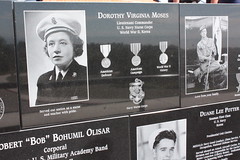Why do we have so many memorials?
Most people couldn’t visit the cemetery where their son or daughter or father was buried after war whether it be World War 1 or World War 2 or more recent wars. Bodies were not brought home to be buried so where could the family grieve?
In Australia, we have many memorial avenues where each tree represents a fallen soldier, or honour boards at RSL clubs noting the names of each person who took part in the war. We also have lots of war memorials in small towns noting those people who served in war from that particular town, not just those who died. Sometimes the small hall in a town is a memorial for the dead or hospital wings named for the fallen. In Britain some stones also include the address of the fallen soldier. Distance was such a big factor in finding somewhere to grieve for the family members.
Tombs of the unknown soldier also allow people to grieve for either an individual or a group who have fallen.
The War Grave Commission wrote a book “Where the Australians rest” describing the cemeteries of where the WW1 dead were buried and this was available to families.
Websites to check out about memorials.
- Here is a link to memorials in New Zealand.
- There is an app you can download to help photograph monuments around Australia in a variety of categories including conflict.
- Wikipedia also has a list by state of Australian military monuments. These can be added to by interested members of the public.
- The UK also has a national inventory of war memorials in a database that is searchable.
- The War Memorials trust includes list for England, Scotland, Wales and Ireland as well as some overseas websites.
Connecting with families
A new term I learnt was fictive kin – the example of a soldier visiting the parents of his dead mate after or during war. A way of grieving with his family even though you are not related by blood.
Who did the soldiers write home to? Generally it was the mother. Who wrote to the soldiers – usually the mother, maybe brothers and wives but how often did fathers write?
Therefore most of the open grief was shown by the women in the family – but how did it affect the fathers? Maybe they felt they couldn’t show their grief – stiff upper lip and all that. Mother’s grief was paramount, maybe because she gave birth to the child who had now died as a soldier.
Fathers often had to sign the form to allow their sons to go to war if they were under 21. Imagine the grief and guilt he must have felt when they didn’t return.
Some middle class families created scrapbooks or memorial books about the life of their son as a way to remember his life up till his death in war.
But very little is known about the working classes and how they grieved for their dead – very little personal memorabilia around.
Readers: If you have lost someone, not necessarily due to war, how have you shown grief? Was it different for a male partner?
